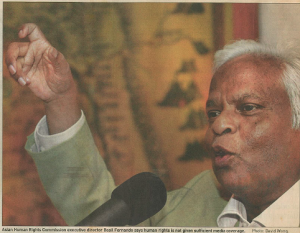Speaking at a forum at the Foreign Correspondents’ Club (FCC) in a personal capacity, he said: ‘It should serve the public, not serve the government.
‘But should it remain a government department or be ‘corporatised’? And if it is corporatised, there are different kinds of models – it could be a Hospital Authority model, the MTR model … they could take a certain percentage from rates collected by the government … there are different kinds of model.’
Mr Woo lamented the lack of quality discourse on current affairs in Hong Kong. He said his vision of the city’s public broadcaster was one of a ‘global international vision’ rather than just a community channel.
‘If Hong Kong is an international city, why should the public service broadcaster not have an international vision and have programming in Cantonese, Putonghua, English, even other languages,’ he said.
‘It is very important to have proper public service broadcasting – there is not enough focus on the quality of the content today.’
Frontier lawmaker Emily Lau Wai-hing told the forum that RTHK, as a public service broadcaster, should be ‘at arm’s length’ from the government and must have a stable source of financing.
‘A public service broadcaster is very different from a state broadcaster. Unfortunately, some people in Hong Kong have mixed the two up … they criticise or attack RTHK for biting the hand that feeds them. They want RTHK to be a propaganda machine.’
At a separate forum on human rights and the media, also at the FCC, Asian Human Rights Commission executive director Basil Fernando said human rights was not covered extensively enough by the media, which did not give such stories the importance that traditional ‘important issues’ received.
He said historically significant events in Nepal and Thailand recently, which had major implications for the development of democratic governments, received inadequate coverage in most media.